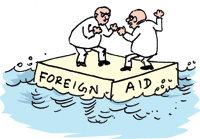| The Sunday Times Economic Analysis By the Economist | ||||||
| |
||||||
Fifty
seven years of missed economic opportunities Can we say the same of the many other upheavals that have strewn the path of post independent Sri Lanka? The communal riots of 1958, the insurgency of 1971, the communal violence of July 1983, the insurgency of 1988-89, acts of continuous terrorism and the civil war unleashed by the LTTE, are among the catastrophic events of the past. They have no doubt been important reasons for the country's economic retardation. The underlying causes for these tragedies are complex and these have not been the only reasons for the country's modest economic progress. The reasons for the country remaining a poor country after 57 years of independence are many. Economic, political, social, cultural, international and other factors account for our underdevelopment. As a nation we have failed to mobilise our material and human resources to achieve the kind of economic growth that nations that were poorer than ours have done. The notable examples are of course Malaysia, Singapore, Republic of Korea, Taiwan and several other East Asian and South East Asian countries. India and China are currently achieving high rates of economic growth reaching near 10 per cent per year. The country's economic history has been characterised by many as a series of missed opportunities. Unfortunately as we pass the 57th anniversary of independence we appear to be once again frittering away another opportunity to lay the foundation for rapid economic growth. The destruction caused by the tsunami has also offered the country an opportunity to rise again and cross the threshold to a rapid path of economic growth and development. There are several pre-conditions to rapid economic growth that could be established. The possibility of ethnic reconciliation and a durable and lasting peace is no doubt the most important. There have been magnificent expressions of goodwill by people of all communities that is a basis for a political settlement. The reconstruction of the country's economic and social infrastructure through foreign assistance is another. The use of social capital for development as demonstrated by people all over the country is another resource that needs to be drawn on more in the coming years. There are many lessons that the tsunami disaster has thrown up and as many opportunities offered. Whether the nation would accept the challenges is the question people are asking. There is, regrettably, evidence as we pass the anniversary of independence that we are once again frittering away the prospect of national reconciliation, political integration and commitment to disciplined hard work. The symbolic gestures of political unity are proving to be a farce. Even the constituent elements of the government are accusing it of political bias and disregard of their views and threatening to resign. The main opposition party is having dissension within its own ranks about co-operating with the government. These dissensions within the southern parties do not augur well for a peace settlement with the LTTE. The ineptness of our administration is quite evident. Impartial observers have found the bureaucracy unable to deliver the goods in the literal sense not merely the metaphorical. Relief goods lie stored up in places, while the affected people are without their basic requirements. True some administrators are working hard day and night, but these do not make up for the many who are inefficient and uncommitted. This is different to the administrative responses and efficiency witnessed during periods of previous crises in the 1950s in particular. Corruption is discernible in many areas with even public officials involved. Doctors called a strike on a matter that should be resolved by an objective and disinterested adjudication of the facts, not through trade union action. It demonstrates the irresponsibility of even professional personnel in the face of a national crisis. Unfortunately the bright spots of people working hard to alleviate the suffering of the victims are being negated by these inefficiencies, irresponsibilities, politicisation, callousness and corruption. These are danger signs which if allowed to grow would cripple the efforts of rehabilitation and resettlement of the displaced, retard economic reconstruction and deny us another opportunity to improve our momentum of economic growth, reduce poverty and unemployment and improve the living standards of our people. For all these reasons, the 57th Anniversary of independence is hardly likely to be a milestone in the country's economic progress. |
||||||
Copyright © 2001 Wijeya Newspapers Ltd. All rights reserved. |
 Perhaps
the country has never celebrated her regaining of independence in
such a sombre manner as two days ago. Nonetheless, since it was
a natural devastation that impelled this sobriety, we cannot lay
blame on anyone.
Perhaps
the country has never celebrated her regaining of independence in
such a sombre manner as two days ago. Nonetheless, since it was
a natural devastation that impelled this sobriety, we cannot lay
blame on anyone.